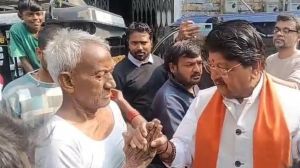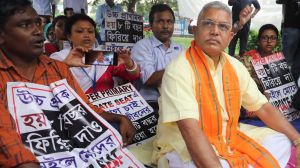Gandhiji146;s Ram
Instead of advising Sonia Gandhi to drop her surname if she did not believe in Ram...

Instead of advising Sonia Gandhi to drop her surname if she did not believe in Ram, Rajnath Singh should tell us if he himself shares Mahatma Gandhi8217;s vision of what Ram stood for.
Gandhiji8217;s secretary, Pyare Lal, writes in The Last Phase, 8220;Gandhiji did not believe in incarnations in the orthodox sense. In as much as God is omnipresent, He dwells within every human being, and all may, therefore, be said to be incarnations of Him. Rama and Krishna were called incarnations of God, because of the divine attributes with which human imagination had invested them.8221; The Mahatma wrote clearly, in Harijan, that they were 8220;in truth creations of man8217;s imagination.8221;
Again he says, 8220;I do not regard God as a person. Truth for me is God.8221; And he would quote the reply given by Shiva to Parvati in Tulsidas8217; Ramayana: 8220;The Rama, on whom gods, sages and seers from Brahma downwards meditate in their devotions is not the Rama of history, the son of King Dasratha, the ruler of Ayodhya.8221;
Gandhiji would never have approved of any agitation to construct a temple in Ayodhya on what was supposedly Ram8217;s birth place, especially if it involved breaking down of a mosque, nor would he have invested the Sethusamudram with any spiritual significance. And, of course, he would have fasted to death to atone for other peoples8217; misdeeds during the Gujarat riots.
The BJP president says that the verse 8216;Raghupati Raghav Raja Ram8217; embodied Gandhiji8217;s spiritual view. Perhaps he forgets that the second line of this dhun is: 8216;Ishwar, Allah tero nam8217;. This line, says Pyare Lal, is a modified version of the original Ramadhun. Manu, the young girl who also walked in the peace mission in riot-infested Naokhali, had heard it as a child during a religious service at a Vaishnava temple in her home town, Porbandar, and it had remained embedded in her memory. It came back to her spontaneously during the prayer meeting at a place called Paniala and she sang it, leading Bapu to recall the old days when 8220;the name of Allah came naturally to the lips even of the orthodox Brahmin priests.8221;
That was the Mahatma8217;s vision 8212; far too noble for people like Rajnath Singh to even comprehend its true meaning.
- 01
- 02
- 03
- 04
- 05































